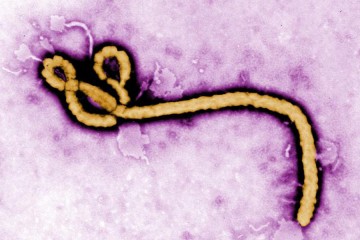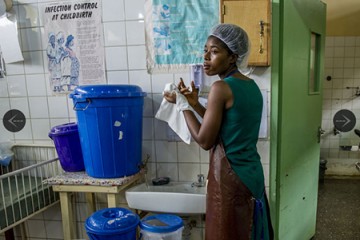The Ebola epidemic is one of the most significant public health challenges in recent memory, with the World Health Organization reporting more than 8,000 cases and more than 3,800 deaths as of Oct. 5 in Guinea, Liberia, and Sierra Leone. The situation in those three West African countries continues to deteriorate with widespread and persistent transmission. There is no evidence that the epidemic is being brought under control. Most experts believe the known cases and deaths are significantly underreported. WHO also reports that 401 health care workers have been infected and 232 have died.
An Ebola outbreak in the Democratic Republic of Congo has been attributed to a separate introduction of the virus into humans. There also have been imported cases in Senegal, Nigeria, and the U.S. In addition, the first documented transmission of Ebola virus outside of the West Africa recently occurred in Spain.
On Tuesday, Oct. 14, from 9 a.m. until 1:30 p.m., the Johns Hopkins Bloomberg School of Public Health will host a symposium to discuss the impact of the epidemic, current and future response, the status of vaccines and possible pharmacologic therapies, recommendations to prevent spread of the disease outside of West Africa, and other issues. A live online broadcast will be available at http://www.jhsph.edu/events/2014/ebola-forum/webcast.html.
The event, titled "Dean's Symposium on Ebola: Crisis, Context and Response," will bring together experts from a variety of fields, from Johns Hopkins and from other institutions and organizations.
Scheduled speakers include:
- Ronald J. Daniels, president, Johns Hopkins University
- Michael J. Klag, dean, Johns Hopkins Bloomberg School of Public Health
- Andrew Pekosz, associate professor, Molecular Microbiology and Immunology, Johns Hopkins Bloomberg School of Public Health
- Michael Osterholm, director, Center for Infectious Disease Research and Policy at the University of Minnesota
- Trish Perl, professor, Medicine, Johns Hopkins School of Medicine, and senior epidemiologist, Johns Hopkins Health System
- David Peters, chair, International Health, Johns Hopkins Bloomberg School of Public Health
- Nancy Kass, deputy director for public Health, Berman Institute of Bioethics, Johns Hopkins University
- Richard Rothman, vice chair, Emergency Medicine, Johns Hopkins School of Medicine
- Joshua Epstein, professor, Emergency Medicine, Johns Hopkins School of Medicine
- Joshua Michaud, International Development, SAIS, Johns Hopkins University
- Peter Jahrling, chief scientist, NIAID Integrated Research Facility
- Peter Agre, director of the Malaria Research Institute, Johns Hopkins Bloomberg School of Public Health
- Joshua Sharfstein, Maryland's Secretary of Health & Mental Hygiene
- Gabor "Gabe" Kelen, chair, Emergency Medicine; director, Office of Critical Event Preparedness and Response, Johns Hopkins School of Medicine
- Derek Cummings, associate professor, Department of Epidemiology, Johns Hopkins Bloomberg School of Public Health
- William "Bill" Glass, director of Strategic Communication Programs, Center for Communication Programs, Johns Hopkins Bloomberg School of Public Health









